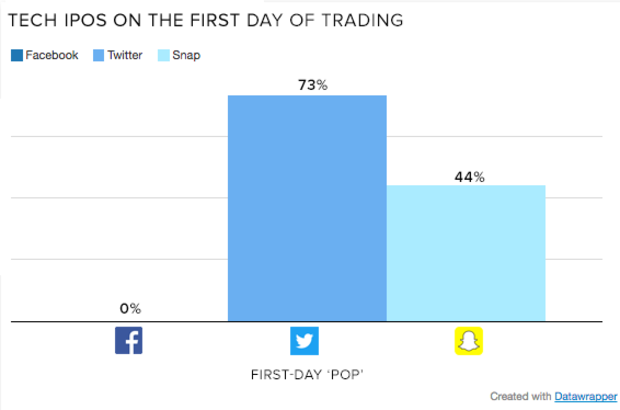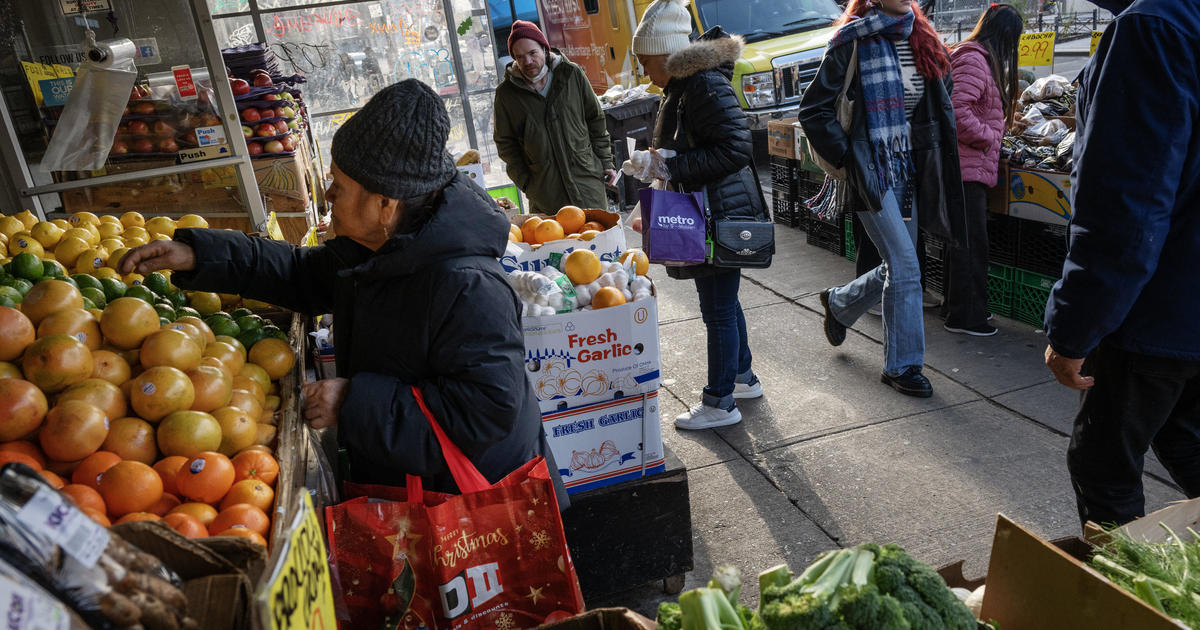Snap debut is strong, but can the hot startup go the distance?
The snap judgment on Snap (SNAP), sponsor of the disappearing-message social network that is all the rage among teens, is that it is a hit -- for its first day as a public stock.
Yet questions linger about the stock’s long-term prospects, given Snap’s weaknesses and the uninspiring record of newly public shares lately.
Up more than 44 percent on Thursday, Snap’s stock gave heart to investors amid a languid market for initial public offerings. Only 26 tech companies went public in 2016. Overall, 105 IPOs took place last year in the U.S., way down from 170 the year before. IPO issuance has dipped since the financial crisis, and low interest rates have made it easier for startups to attract private capital from venture investors, delaying their need to go public.
On average, IPOs underperform the market in the three years after going public, according to Jay Ritter, a University of Florida professor who studies new share offerings. Since the March 2009 market bottom, after the financial crisis, the S&P 500 has climbed 254 percent, while the Bloomberg IPO index rose 165 percent. What’s more, eight of the 10 biggest tech IPOs dropped by between 25 percent and 71 percent in their first 12 months post-IPO, a recent Reuters analysis found.
A debate swirls around why IPOs are such investment laggards. One reasonable explanation is that a lot of them are simply not ready to go public, but their founders want to cash in. Big IPOs create a lot of instant billionaires, especially in Silicon Valley. The ongoing stock rally, which has picked up speed since President Donald Trump’s election, may coax more to take the plunge.
The fear is that Snap, like too many IPOs before it, will fizzle as well. One key date to watch out for is six months from now, in September, when the stock’s lockup expires. A lockup is the period after a stock sale when company insiders are forbidden to sell their holdings. This is meant to thwart insiders, who got shares for much less than the IPO price, from flipping the stock for an instant profit.
When they do sell after the lockup, and if there’s a rush for the door, the price can take a pounding and regular investors can get hurt. To lessen that threat, Snap has imposed a year-long lockup for a quarter of the stock it sold, allocated to existing investors. On the other hand, that means there’s another date to watch out for, in March 2018.
Nobody doubts that the company’s social network, Snapchat, has a strong user base. Its revenue was up sevenfold last year to $404 million. Although it has mega-watt buzz, the trouble is that it hemorrhages money. In 2016, it lost $515 million. Plus, the growth of its users is slowing, thanks to competition from established competitors.
That’s why some wonder whether Snapchat is merely a fad whose appeal will wane. As Joshua Brown, a financial adviser at Ritholz Wealth Management in New York, wrote on his blog: “The bad news is that the whole appeal of the site to its core users -- the kids who never shut the app off and check in 50 times a day -- is the exclusivity of it.” Unlike other social networks, he reasoned, your posts can’t go viral, thus limiting its appeal over time.
Both Facebook (FB) and Twitter (TWTR), Snap’s chief rivals, struggled after their IPOs. Wall Street fretted that that desktop-centric Facebook couldn’t make the transition to mobile users, and that Twitter couldn’t expand its audience to be more than a marginal player. Facebook has silenced doubters as it shifted to cell phones, and Twitter, while a bona fide cultural phenomenon (ask champion tweeter Donald Trump), remains a work in progress.
Facebook went public in May 2012 at $27 a share and went nowhere for a year. Then it took off, and now is at $136, a fivefold increase. Twitter took flight at $41 a share, and today it changes hands at $15, down almost two-thirds. It is far from alone: Online storage provider Box (BOX) and online crafts marketplace Etsy (ETSY) are just two of the other once-promising tech firms whose stock has wilted after a ballyhooed launch.
Sometimes, IPO investors fall victim to head fakes. For tech stocks in particular, early pops followed by slides are all too common. Prime example: Twilio (TWLO) debuted in June at $15, and vaulted to $70 in September before tumbling to $32. Despite customer and revenue growth, investors apparently got tired of the cloud platform provider’s persistent red ink. Twitter had a soaring first-day showing, 73 percent, before it shriveled. And Facebook did not go up at all at its debut.
Can someone with a yen to invest in IPOs find safety in numbers -- that is, by buying a fund that specializes in them, which gives the assurance of diversification? It depends. Since its late 2013 launch, an exchange-traded fund dedicated to initial offerings, the Renaissance IPO ETF (IPO), has advanced just 9 percent. During that time, the SPDR S&P 500 ETF (SPY), which tracks the broad-market index, has soared 41 percent.
The larger and older (11 years) First Trust US Equity Opportunities ETF (FPX), on the other hand, has done much better. Investors tripled their money since it started. The S&P is up 80 percent since then. Ritter said the reason for First Trust’s better fortunes is that it avoids small companies and IPOs with big (70 percent or more) surges on the first day. That makes for safer bets, he believes.
Snap -- with its $31 billion market value and its impressive, but more modest, first-day rise -- meets those criteria. That said, no one knows if Snap, the latest tech darling, will go the way of Pets.com and other doomed darlings of the late-1990s tech bubble, or ascend to the heights of Facebook.
One thing is for sure: It is not a stock for the faint of heart.




